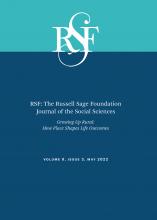Abstract
Amid the opioid crisis, the number of kinship families—or children living with relatives—has risen dramatically, particularly in rural communities. Using in-depth interviews with relative caregivers and local legal actors in Appalachian Kentucky, I consider how rural kinship families are formed. I demonstrate how relatives’ experiences depend on the social capital they hold with local legal actors who regulate kinship care. Whether a relative possesses positive, negative, or no social capital with these actors affects their ability to secure their ideal legal arrangement and the level of surveillance they must endure. These findings illuminate how seemingly rigid legal processes can reproduce inequalities in rural jurisdictions. In this case, the unequal distribution of legal-specific social capital precipitates different levels of stability and support afforded to rural kinship families.
- © 2022 Russell Sage Foundation. Brant, Kristina. 2022. “When Mamaw Becomes Mom: Social Capital and Kinship Family Formation amid the Rural Opioid Crisis.” RSF: The Russell Sage Foundation Journal of the Social Sciences 8(3): 78–98. DOI: 10.7758/RSF.2022.8.3.03. This research was funded by the Harvard University Multidisciplinary Program in Inequality and Social Policy and a National Science Foundation Doctoral Dissertation Research Improvement Grant, #1904002. Direct correspondence to: Kristina Brant, at kbrant{at}psu.edu, 111A Armsby Building, Pennsylvania State University, University Park, PA 16802, United States.
Open Access Policy: RSF: The Russell Sage Foundation Journal of the Social Sciences is an open access journal. This article is published under a Creative Commons Attribution-NonCommercial-NoDerivs 3.0 Unported License.






